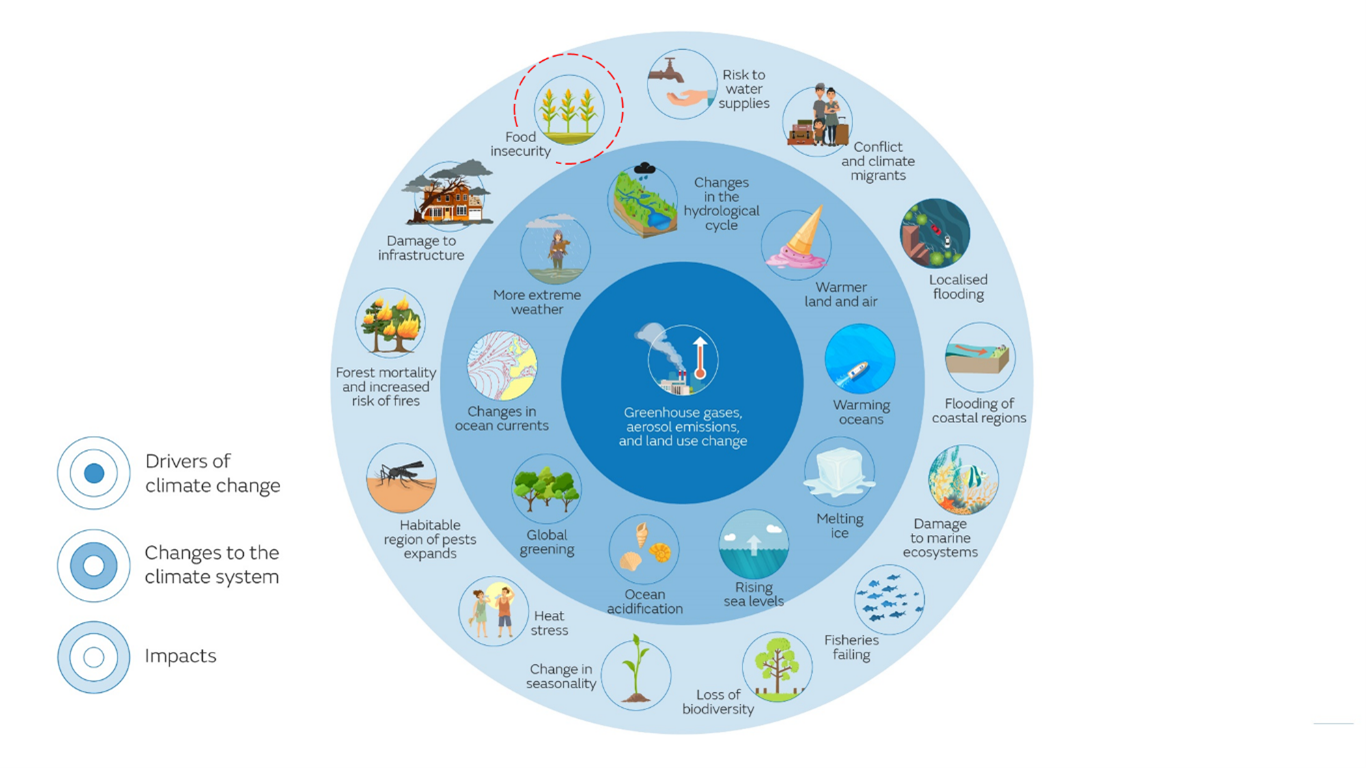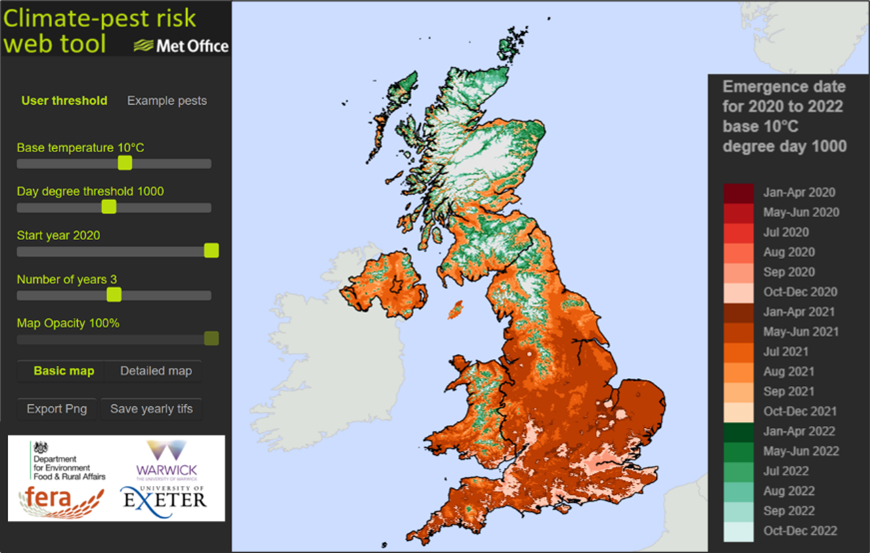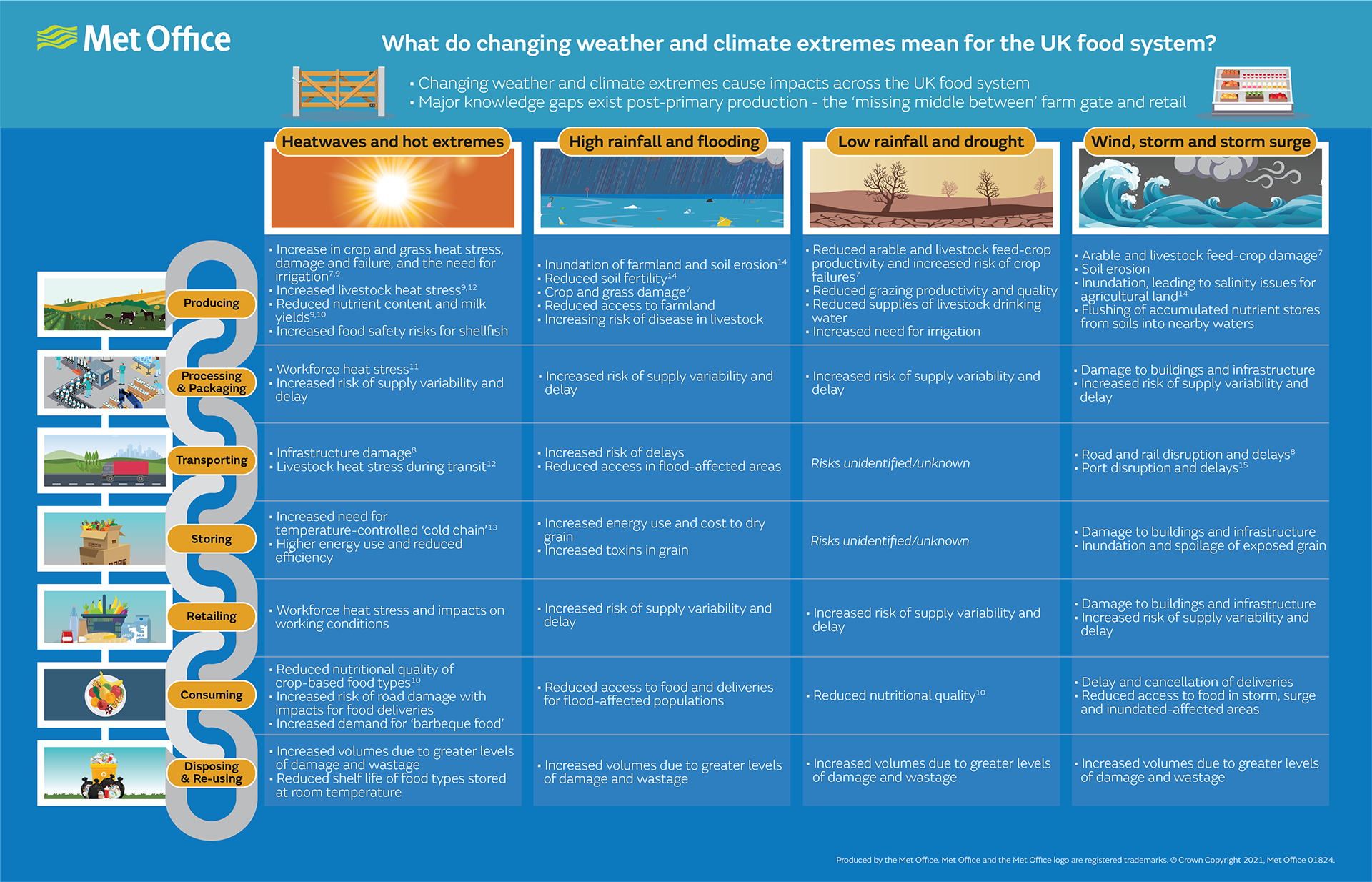Food, Farming and Natural Environment Climate Service
Met Office science is helping UK farmers and the wider food chain prepare for a changing climate. This work includes a number of ‘Climate Services’ which are funded by Defra (Department for Environment, Food and Rural Affairs).
UK Agriculture, Food and Climate Adaptation
The UK Climate Projections (UKCP) show us that the UK is likely to experience ‘hotter, drier summers and warmer, wetter winters’, as well as an increase in extreme weather events such as heavy rainfall, periods of drought and heatwaves. These changing conditions mean that we need to adapt to our changing climate, including in agriculture and the wider food sector. Adaptation is action that reduces or overcomes climate change impacts that are already happening or will happen. One example of adaptation in the agriculture sector could be building shelter for cattle so that they can be shaded during extreme heatwaves, reducing the likelihood of cattle heat stress.

The Climate Change Committee’s (CCC) Independent Assessment of UK Climate Risk report (2021), which uses UKCP projections, identifies climate change as one of the greatest risks to the UK food sector. The CCC’s Advice Report sets out 61 specific climate change risks and opportunities in the UK which should be considered in the next five years. It also highlights eight priority risk areas needing urgent further action over the next two years. Two out of eight of these priority risk areas relate to UK food: ‘risks to crop, livestock and commercial trees from multiple climate hazards’ and ‘risks to supply of food, goods and vital services due to climate-related collapse of supply chains and distribution networks.’
Food, Farming & Natural Environment climate consultancy and services
The Defra-funded Met Office climate service on Food, Farming and Natural Environment has been running since 2017 and focuses on the impacts of climate change on farming and the food system, with the aim of informing policymakers on the future adaptation needed in the agri-food sector. This involves close collaboration with Defra and informs policy and action through Defra’s 3-yearly UK Food Security Report and contributions to the Climate Change Risk Assessment and National Adaptation Programme. The climate service also has strong links to the UK’s Global Food Security Programme.
Services available
Plant Pest and Disease:
Pests, pathogens and invasive non-native species present serious risks to agricultural productivity, with consequences for livelihoods and businesses. Large-scale outbreaks or invasions may also have ramifications for food security. Climate change is increasing the risk of impacts from pests and pathogens, due to warmer and wetter conditions especially in the winter months. This work also looks to enhance emergency response to pests and diseases using climate and weather data. In collaboration with Defra, Fera Science, University of Exeter and University of Warwick, we have developed a web tool for estimating priority pest emergence. The pest web emergence tool uses gridded climate data and pest-climate relationships to provide estimates of when microclimate conditions might be suitable for known, invasive plant pests. Guidance on how to use the tool can be found here.

Food Security:
Weather hazards affecting the UK food system include low rainfall and drought, wind, storms and storm surges, high rainfall and flooding, and heatwaves and hot extremes. The occurrence and severity of these hazards is expected to worsen with increasing climate change. As well as research by Met Office scientists on topics such as climate impacts on crop yields, soil erosion and animal heat stress, the climate service is working in collaboration with a range of partners to understand effective resilience and adaptation measures for UK agriculture and food. For example, we are working with Defra’s Genetic Improvement Networks (GINs) to build ‘climate thinking’ into future crop breeding, and with ADAS to understand potential adaptation options in agriculture.
Whilst the impacts of climate change on primary production (e.g., drought leading to crop failure) are relatively well studied, there is less work looking at other parts of the food chain. For example, increased occurrence of heatwaves will impact upon workforces in the processing and packaging part of the food chain, whilst increasing storms will impact upon transport and infrastructure systems.
A recent partnership activity looking at impacts of weather and climate extremes on the UK food chain has brought together the Met Office Academic Partnership (MOAP) Universities of Exeter, Leeds, Reading, Bristol, Oxford and University College London, Defra, the Food Standards Agency, UKRI-BBSRC, and The Global Food Security Programme. An initial study explored climate change impacts on all parts of the food chain to help inform UK Government decision making and priorities moving forward. We have recently brought together a broad community with the Met Office academic partners to discuss adaptation and policy responses, and their consequences in interdisciplinary workshops to identify critical uncertainties, scenarios and quick wins to inform future funding priorities and support decision making in policy and industry.

Other work in this area
Compound Events:
Work under the UK Climate Resilience Programme has looked at the impacts of compound events on agriculture. These events happen when two or more weather/climate hazards occur simultaneously or in close succession, potentially causing greater impacts than when the hazards occur alone. Future projections show UK-wide increases in the frequency and duration of thermal heat stress in dairy cattle and potato blight events. This study uses the UKCP regional projections to examine the effect of climate change on the dairy and potato farming sectors over the next thirty to fifty years (2051-2070). You can read more on this study by Freya Garry and colleagues here.
If you’d like to find out more email [email protected] and follow #GetClimateReady on Twitter.


